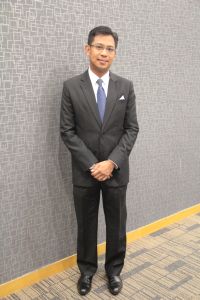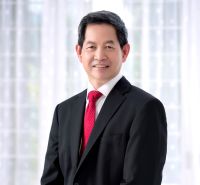Monday April 13, 2015
Malaysia needs more accountants. Right now the country with a population of 30 million only has 31,000 professional accountants.
“We are underserved in the professional accountants segment,” says Johan Idris, managing partner at KPMG in Malaysia and president of the Malaysian Institute of Accountants (MIA).
Besides the needs of the country, there is also the exponential growth in Asia and globalisation – all of which add up to a higher demand.
“The shift in the balance of economic power in the wake of the 2008/09 global financial crisis with the focus towards Asia has definitely created an exciting landscape for the profession. Compounded by the evolving economic and business environment, the demand for accountants has grown exponentially,” says Johan.
 Johan Idris
Johan Idris
Hong Kong is now one of the leading countries in Asia when it comes to accountancy; not surprising for a major financial centre. According to Johan, Hong Kong is ahead of China in terms of regulation of the accountancy profession.
“Singapore also shows potential in becoming a leading global accountancy hub for the Asia-Pacific region. As a leading business hub in the South-East Asian region, Singapore naturally has an advanced approach when it comes to accounting standards. Singapore's financial reporting standards are largely based on the International Financial Reporting Standards (IFRS),” explains Johan.
Competing for talents
According to Lee Soo Fern, senior executive director and Malaysia talent leader at Ernst & Young, Malaysia now competes globally for talents.
Currently, our competitors for good talents are Singapore, Australia and Britain, which are popular higher education destinations for Malaysian students.
“Given how globalised the world has become, talents cross borders easily today for various reasons – education, family, career opportunities and advancements. So it is really a 'war' to try to secure talents, particularly accountancy talents because these talents have a lot more choices today,” she adds.
 Lee Soo Fern
Lee Soo Fern
EY promotes “the exceptional EY experience” – the learning, exposure, coaching, experience and network that the talents will gain in EY. Through a variety of challenging assignments, ongoing coaching and personal development, EY professionals can increase their acumen as well as their abilities.
EY must be doing something right because according to Lee, the retention rate is “positive”.
Higher value
BP Business Service Centre Asia also offers talents more opportunities in terms of development and growth seeing as it is higher up the value chain.
According to its tax director Ainol Yaacob, although BP started out with more transactional services 10 years ago, the company now tackles more high-value work.
“For tax, we do a lot more complex and high-value work. It's more like a tax functional role rather than a shared services role.
“We handle some of the simple tax authority queries from the countries that we cover such as US, UK, Australia, and New Zealand. In Asia, we cover Malaysia, Singapore, and China.
“Those things are also a good reflection of the talent that we have within Malaysia because without those talents we are not able to do some of the complex regulatory compliance work,” says Ainol.
"However, there isn't enough of the right talents coming through. Because of the high-value work that is required, the company needs to be more selective in its recruitment.
“We have specific programmes to actually develop new managers, potential managers, potential future leaders. What we also emphasise which is equally important is actually their potential leadership skills,” he says.
The opportunities are there if graduates and talents are willing to see the bigger picture. At BP, the focus is on development, not just within the company but also within the BP Group internationally.
 Ainol
Ainol
Ainol knows that it's not always about the ringgit and sen. Other factors often come into play. He should know. He returned to KL in 2009 under the Returning Expert Programme (REP) after spending 13 years in England where he worked with KPMG and Deloitte.
“We are competitive and I think people need to look at what is the definition of competitive for each of them. From our point of view, competitive includes the whole package – from the financial rewards all the way to the potential and opportunities that you would have to develop your career,” says Ainol.
Government initiatives
According to Lee, EY has been successful in bringing home a number of young graduates and experienced professionals from abroad.
“We believe the success is due not only to the EY employee value propositions, but also to Malaysia’s dynamic economic growth and development. Under the Economic Transformation Programme (ETP), there are many high economic impact projects across various sectors which hold a myriad of opportunities for the brightest and best Malaysian talents,” says Lee.
MIA's Johan agrees that Government initiatives are important to pave the way for talents to return home. He believes that higher education institutions also play an important role.
Sunway TES seems to be leading the way with its plans to produce 5,500 professionally qualified and competent accountants by 2020.
“There is a need for more academic institutions to move in a similar direction to ensure we meet the target set by the Government to have 60,000 professional accountants by 2020,” says Johan.
He believes that one way to encourage more graduates and secondary students to pursue professional accountancy qualifications is by making the profession look “cool”, rather than too traditional – which is what MIA is now trying to do.
With talent regularly cited by employers as being a top business challenge, TalentCorp works closely with leading employers to strengthen Malaysia’s talent pipeline, particularly in developing young Malaysian talent.
To address the shortage of qualified professional accountants in Malaysia and incentivise employers to invest in providing fresh graduate hires with professional qualifications, TalentCorp collaborated with five professional bodies of accountants last year on an Upskilling Programme for the finance shared services and outsourcing (SSO) industry. The accounting bodies included the Association of Chartered Certified Accountants (ACCA), Certified Practising Accountants (CPA) Australia, Institute of Chartered Accountants in England and Wales (ICAEW), Malaysian Institute of Certified Public Accountants (MICPA) and Chartered Institute of Management Accountants (CIMA).
Further, as part of the Government’s efforts to strengthen human capital development, a tax incentive for industry-recognised professional certification programmes was included in the 2015 budget. This incentive aims to encourage companies to invest in developing their employees to pursue professional certifications in specific areas including Accounting and Finance.
In addition to these initiatives, TalentCorp's efforts to bring back Malaysian talents abroad and open doors for top class foreign talent to be trained in Malaysia have been a boon.
“This way there is more room for a wider talent pool to be trained as professional accountants in Malaysia,” says Datuk Gan Ah Tee, BDO regional board member for ASEAN and managing partner of BDO Malaysia.
Remaining competitive
To remain competitive, many more corporations now have a regional approach to doing business. BDO is no exception.
BDO Malaysia is a member firm of BDO International, the world’s fifth largest network of professional service firms. In Malaysia, the BDO group consists of an experienced team of more than 700 staff led by 70 partners and directors from offices in Kuala Lumpur, Penang and Johor Bahru. According to Gan, BDO started its plans to have a regional footprint in 2007 and are now in all 10 ASEAN countries.
BDO is also a pioneer employer participating in the MY ASEAN Internship programme launched in January this year. A collaboration between the Ministry of International Trade and Industry (MITI) and TalentCorp, MY ASEAN Internship aims to increase overall awareness on ASEAN among youth in Malaysia and looks to place high-achieving students from Malaysian universities as interns in Malaysian companies with regional operations within ASEAN countries.
Becoming a leading accountancy hub is not just a pipe dream. It is within reach as long as all stakeholders work together to achieve the aim.
“Ongoing reviews of the accounting programmes at the local institutes of higher education needs to be in place in order to improve the quality and relevancy of content and ensure graduates’ readiness. This would enhance their employability in the job market,” says Johan, stressing the importance of fluency in the English language.
Gan suggests benchmarking against world class accountants as well as reviewing the remuneration packages and implementing smoother immigration processes for retaining and attracting good foreign talents to ensure Malaysia achieves the target of becoming a leading accountancy hub.
Within reach
 Gan
Gan
Turning Malaysia into a leading accountancy hub will provide confidence to global capital market players in line with plans to achieve the high-income status as well as Vision 2020's developed nation status, says Johan.
BDO's Gan is confident Malaysia is ready.
“Malaysia already offers many of the world leading professional accountancy qualifications. It also has a track record of students successfully qualifying and doing very well when trained here in Malaysia.
“For example, we are one of the leading countries when it comes to students being conferred ACCA World Prize awards as well as ICAEW Subject Order of Merits, all supporting the quality of students that are going through Malaysian doors. We also have one of the largest pools of students and members of CPA Australia outside Australia as well as our very own MICPA tie-up with ICAA, a testament of how important Malaysia is viewed for training world class qualified accountants,” says Gan, highlighting that Malaysia is also a leader for Islamic Finance.
He points out one of the steps taken to help achieve the ETP entry point project (EPP) to transform Malaysia into a leading accountancy hub is the establishment of the Committee to Strengthen the Accountancy Profession (CSAP).
“As an alumni of ICAEW, I strongly encouraged the formation of the ICAEW Regional Centre of Excellence in Malaysia last year for the training of UK Chartered Accountants in the region,” says Gan.
For opportunities like those offered by these employers, explore the Global Malaysians job portal. Global Malaysians makes it much easier to seek career opportunities back home and be part of Malaysia's economic transformation. Visit myworklife.my/malaysia-job-boards for more.